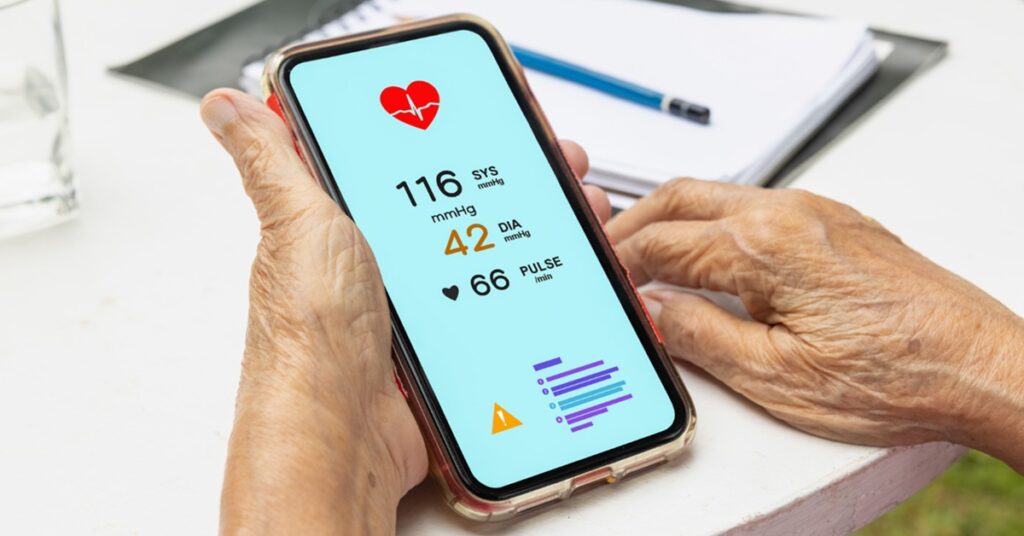Technology has proven to be a great ally in health, and blood pressure measuring apps are a perfect example of this. These apps allow you to record, monitor and track your blood pressure levels quickly and conveniently. With them, you can create a detailed history to better understand your cardiovascular health.
Disclaimer: This article is for informational purposes only and is not a substitute for medical advice. Blood pressure measuring apps are complementary tools and should not be used as a substitute for medical diagnosis or treatment. It is always recommended that you consult a healthcare professional for a proper assessment of your condition.
1. Blood Pressure Monitor

Blood Pressure Monitor is one of the most popular apps for measuring blood pressure. It allows users to record systolic and diastolic blood pressure values, as well as pulse rate. The great thing about this app is its ability to offer detailed graphs that help you visualize the evolution of values over time. You can also set personalized reminders so you don't miss any important measurements, ensuring strict control.
In addition, BP Monitor offers reminders that help you create a routine for measuring your blood pressure regularly, a feature that is especially useful for those who need constant monitoring, such as hypertensive patients. It also allows you to export data in different formats, making it easier to send information to your doctor. Available for Android.
2. iCardiac: Measure the Heart
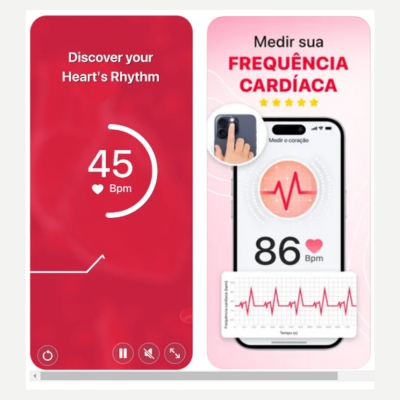
With the iCardiac – Heart BPM & HRV app, checking your health is quick and easy. Use your iPhone to measure your heart rate, record your blood pressure and oxygen saturation in just a few seconds. This app is known for its accuracy, offering a reliable experience for monitoring important vital signs.
Features include BPM and HRV measurement, daily vital sign logging, and healthy lifestyle advice with Doctor AI. Additionally, iCardiac integrates with Apple Health, making it easy to continuously monitor your health. Its modern and intuitive interface is another highlight. Available for iOS.
3. AVAX Blood Pressure
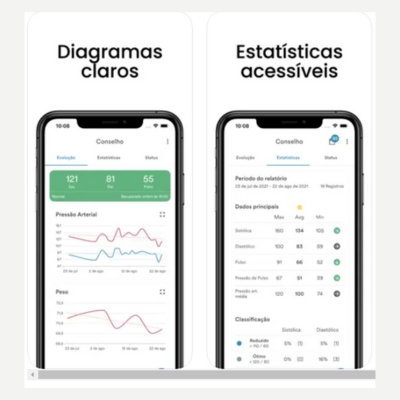
This app focuses on keeping a detailed diary of users’ blood pressure levels. Although an external blood pressure monitor is required, the tool is very useful for recording and organizing measured values. Photoplethysmography (PPG) technology is used to facilitate the tracking of results, providing a more reliable and scientifically validated method for monitoring blood pressure. In addition, it offers functions to synchronize data to the cloud, ensuring secure and remote access.
AVAX also features intuitive graphs that make it easy to view blood pressure levels over time. These help detect trends and help identify moments when blood pressure is out of control. Another benefit is the simple and intuitive interface, which allows people of all ages to use the app without difficulty. Available for Android.
4. Blood Pressure Pro
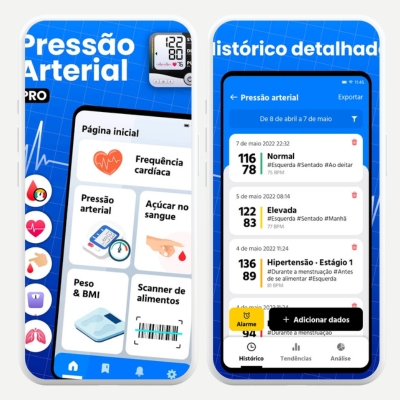
With a user-friendly interface, this app is easy to use, offering precise instructions for the user to record measurements correctly and effectively. It also stores all measurements in a comprehensive history, allowing for a more detailed analysis of blood pressure patterns. A useful option is the ability to set alerts for measurements at specific times of the day.
Another interesting point about Blood Pressure Pro is its ability to measure blood sugar levels and provide health tips to users. User reviews are quite positive, with many highlighting the ease of use and accuracy of measurements taken with the help of the app. It is also possible to export detailed reports in various formats. Available for Android.
5. Blood Pressure Diary
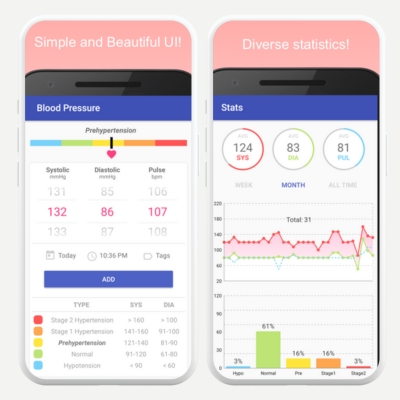
This app allows you to record systolic and diastolic blood pressure, as well as pulse rate, providing a more complete view of your health. It also offers additional features, such as adding tags and the ability to export data in CSV format, making it easier to share information with your doctor. For added convenience, you can set up reminders and alerts for regular measurements.
One feature that sets the Blood Pressure Diary apart is the ability to generate detailed reports and graphs that help you better understand how your blood pressure has changed over time. Automatic backup is also a big plus, ensuring that your records are always available and safe, even if you change or lose your device. Available for Android.
Benefits of blood pressure measuring apps
- Daily control: help control and monitor cardiovascular health in a practical way, with daily and accurate records for analysis.
- Full reports: provide detailed graphs and reports to understand the evolution of pressure levels over time, allowing for greater prediction and prevention of problems.
- Reminders: They offer reminders to create a routine of regular measurements, which is essential for those with chronic diagnoses such as hypertension.
- Integration with other apps: integrate with other health apps, such as Apple Health, for more complete and centralized monitoring of vital data.
- Data sharing: allow data sharing with doctors, facilitating more assertive and personalized consultations and diagnoses.
- Additional Resources: Some apps include additional functions, such as a blood glucose meter, oxygen saturation and heart rate history, making health monitoring more complete.
How to choose apps to measure blood pressure?
Choosing the right app depends on your needs and expectations. First of all, consider whether the app is compatible with your device and whether it offers the features you need, such as blood pressure logging, data export, or detailed graphs. Also, check whether it has reminders and is easy to use, taking into account your routine.
Choose apps with good reviews in official stores and read other users’ comments. This can help you identify the strengths and weaknesses of each option. Also, if you’re looking for a scientifically validated solution, check if the app has some kind of certification or partnership with medical institutions, which adds more reliability.
Finally, consider the interface and usability. An effective app should be easy to use and intuitive, allowing you to record and view information without difficulty. For those who travel frequently, considering options that sync data to the cloud can be an excellent choice.
Frequently Asked Questions About Blood Pressure Apps
1. Are blood pressure measuring apps reliable?
Reliability varies between apps. Some only record data measured by external devices, while others use technologies such as photoplethysmography (PPG). However, none of them replace certified medical devices. They should be used as complementary tools for organizing and recording data.
2. Do I need a blood pressure monitor to use the apps?
Yes, in most cases. Apps serve as complementary tools to record and organize data obtained from an external blood pressure monitor. Some options can also integrate with wearable devices that measure heart rate.
3. Is the data secure?
Security depends on the app. Choose options with good reviews and that clearly state how data is stored and used. Additionally, checking whether the app offers encryption can ensure greater security.
4. Do the apps work on older devices?
Not all. Check the app requirements before downloading to ensure compatibility with your device. Updating your operating system may also improve the performance of some apps.
5. Can they replace medical consultations?
No. The apps are complementary and should not be used as a substitute for professional evaluation. Only a doctor can properly diagnose and treat health conditions.
6. Do blood pressure measuring apps consume a lot of battery?
Battery consumption varies depending on the functions used, especially if the app uses sensors such as the camera or microphone. To save power, close apps when they are not in use.
Read also: Apps to monitor your cholesterol levels
Monitor your health in a practical way
Blood pressure apps are an excellent way to monitor your cardiovascular health. They allow for constant monitoring and help identify patterns that can be discussed with your doctor, promoting more integrated care. In addition, they offer convenience by recording data in an organized and accessible way.
Using them consciously and in conjunction with medical advice can make all the difference to your quality of life, preventing complications related to hypertension and other conditions. These tools are great allies for those who want to take control of their own health in an easy and efficient way.

